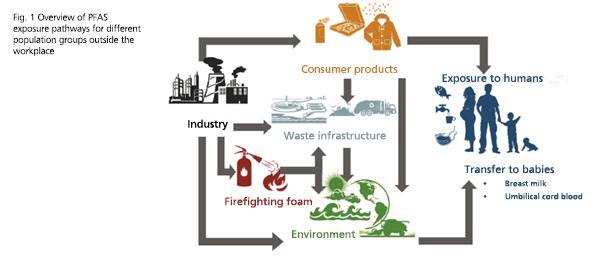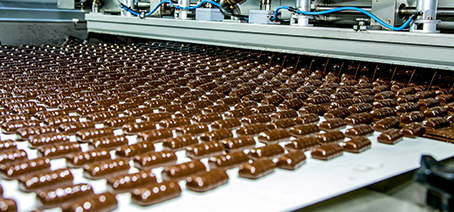
Everything you need to know about PFAS and lubricants made without them
Running a sustainable business involves developing products with minimal impact on the environment and human health. To achieve this, our research and development teams carefully follow constantly changing regulations. They do this to ensure that the products we manufacture meet all the necessary requirements and are safe to use.
Per- and polyfluoroalkyl substances, better known as PFAS, have come into sharp focus globally as we learn more and more about their potential long-term effects. In this article we look at the facts about PFAS, how they are used, and what FUCHS is doing to develop lubricants that don’t include them.
What are PFAS?
PFAS encompass thousands of different chemicals which are synthetically produced and do not occur naturally in the environment. The substances are known for their water-, dirt- and fat-repellent properties and are used in a wide range of different products, including clothing and footwear, frying pans, firefighting foam, ski wax, beauty products, lubricants and more.
PFAS are ‘persistent’ or ‘hard-to-degrade’ substances, and they can have harmful effects on human health and the environment. They are known as ‘forever chemicals’, as they remain in the environment and can end up in land and drinking water at every stage of a product’s life cycle. There are currently no effective methods of eliminating all PFAS in water treatment works, and this means that they can enter both humans and animals via food and water. Exposure to certain types of PFAS has been linked to an increased risk of some kinds of cancer, liver disease, thyroid disorders and other problems.

How is the use of PFAS regulated within the EU?
Several PFAS are already subject to restrictions, but the consensus is that more needs to be done. The European Chemicals Agency, ECHA, is processing a proposed comprehensive restriction presented in February 2023 on over 10,000 per- and polyfluoroalkyl substances. The aim is to prevent PFAS from reaching the market, and thereby reduce their spread to people and the environment. The objective is to ban all use of PFAS within the EU, unless they are essential to society.
During a consultation period, businesses and other stakeholders were able to submit comments, and these will be used to help formulate the restrictions and, where relevant, exemptions. An exemption is often requested in cases where the use of PFAS is critical and there is no known alternative, or where their addition presents minimal risk to the environment or exposure to humans.
It is not currently known what the final resolution will look like, or when it will come into force. Even so, our teams at FUCHS are carefully monitoring developments and making preparations by working actively on product development and alternatives for our customers.
Where are PFAS used in our products?
Only a very small percentage of our wide range of oils, greases and lubricants are currently based on PFAS. The vast majority of our lubricants are completely free of them.
PFAS can be found in fluorinated lubricating greases and oils, which may contain PFPE base oil, PTFE thickener or PTFE as an additive. PTFE thickener offers excellent performance in a vacuum and at high temperatures. Because of this, it has often been used in semiconductor manufacturing, automotive and aviation applications, where high temperatures and/or vacuums are a factor. But fluorinated lubricants are used in many other applications too, so all kinds of industries are affected.
How is product performance affected when PFAS are removed?
FUCHS has conducted far-reaching studies to establish the performance benefits of using PFAS in lubricants. There are several cases where non PFAS-based technology offers the same or better performance – particularly regarding low-temperature properties, stick-slip behaviour, and wear protection. In applications that require high temperatures, chemical inertness and vacuum conditions, the removal of PFAS presents certain technical challenges. We are currently working on the next generation technology to meet the specific requirements of our customers.
Does FUCHS offer any alternatives to PFAS-based lubricants?
We can offer suitable alternatives depending on application, temperature and performance requirements. Feel free to contact us for advice, and to discuss your applications and your need for PFAS-free lubricants.
Find out more here (in Swedish):
Sverige bakom lagförslag som ska stoppa PFAS-användningen inom EU - Kemikalieinspektionen
Nytt EU-förbud kan stoppa all tillverkning och försäljning av PFAS - Kemikalieinspektionen
This might also interest you

ACT – Our path to Advanced Circular Technologies
ACT or Advanced Circular Technologies sums up everything we do to transform our value chain from linear to circular. Starting with raw materials all the way through manufacturing, the use of our solutions and up to the end-of-life. Which is now bound to become a new beginning.

The importance of eliminating contamination sources in food production
What are MOAH and where do MOAH come from? Modern food manufacturers face all kinds of challenges, rules and regulations, both from governments and the market. How can the risk of contamination be eliminated?
Want to know more?

Maria Wilén
Product Manager Grease, Specialties,
Refrigeration oils & Accessories
maria.wilen@fuchs.com